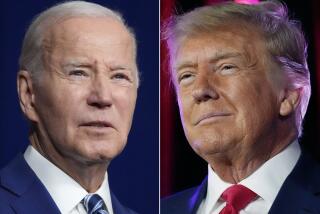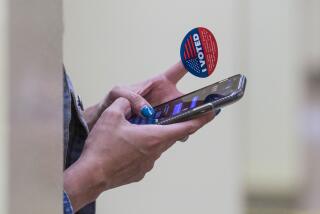A Taste of Democracy, a Hunger for Security
- Share via
BAGHDAD — Today, Iraqis are summoning their courage and casting their ballots in a bold act of suffrage. But it remains unclear whether their bravery will put Iraq on the road to democracy, much less whether the election heralds a new era of participatory government in the Middle East as promised by the Bush administration.
Iraqis and international observers alike are divided in their expectations of today’s balloting. Some see the election as a superficial event that cannot bring the things that citizens want even more than a vote: security, water, electricity and economic improvement.
Others view the election as illegitimate because U.S. troops remain on Iraqi soil and thus the vote, they say, is being held at the point of an American gun.
Still others believe that it is the beginning of a grand march that will lead to a fully democratic society. Indeed, there are real signs of the beginnings of a society in which opposing views are tolerated in a way that is rare in the region and was unheard of under Saddam Hussein.
In the coming months, skeptics are likely to carry the day. For these Iraqis, true democracy is dependent on security. They are more than willing to trade away some of the freedoms associated with democracy indefinitely if they can get a guarantee of safety and stability.
From this vantage point, it is the strength of the insurgency, not an election, that will determine whether Iraq will become a stable society.
Without security, Iraqi government officials will be reluctant to end the state of emergency and are likely to continue to rely disproportionately on force to accomplish their goals.
Eventually, many observers believe, there will be a confrontation between the security forces, which are mostly Shiite and Kurd, and the largely Sunni Arab insurgency.
“In a country like this with zero respect for human rights, no colonial experience of rule of law, no Magna Carta, how are you going to build a democracy?” a Western official said.
Iraq, like many Middle Eastern countries, has been ruled by a succession of despots, kings and invaders. Even the British, who dominated the country briefly in the years after World War I, did not install the kind of complete governmental system they set up in colonies such as India. For the last 35 years, Iraq has been run by one ruthless man and his corrupt family and cronies, meaning that the majority of the population has experienced only the fear-filled atmosphere of a dictatorship.
Some of those cronies are believed to be supporting the insurgency. But they aren’t alone in believing that the election is illegitimate. Many Iraqis do not support the violence but also do not believe true democracy can develop while U.S. troops are the dominant force in the country.
The fear of observers is that this latter community will not vote and then will drift closer to the insurgency, prompting the government to turn to ever more repressive measures to get control of the rebellion.
Those who believe that the election is a crucial part of Iraq’s journey toward becoming a First World country include many in Iraq’s political class, who sincerely believe that an elected government will have newfound influence both in the country and with neighbors.
“The elections are an important step toward a democratic system of government. This will be a legitimate mandate from the people.... This will be very different from the previous government,” said Barham Salih, the interim deputy prime minister, referring to the U.S.-backed government now in power.
Salih is a fervent proponent of the democratic process, though he is also realistic about the hardships ahead. “Elections are not the magic solution, they are not a panacea for Iraq’s problems, but the government will have to be responsive to this new parliament,” he said, referring to the national assembly that Iraqis are electing today. The assembly will choose a presidency council and prime minister.
Almost since Hussein’s fall in April 2003, Iraqis, especially in Baghdad, the capital, have said they want a leader who is strong enough to get a handle on the security situation. Because the insurgency is strong in the capital, it is a crucial point of reference for those who run the country.
Polls show that a declining percentage of Iraqis believe the country is headed in the right direction and that the main reason is the deteriorating security situation. A poll by the International Republican Institute taken in the first week of January found that for the first time in six months the percentage of Iraqis who believed the country was headed in the right direction had dipped below 50%.
The numbers are startlingly lower in Baghdad, home to 6 million Iraqis. Here, just 37% believe the country is headed in the right direction. And in Baghdad more than elsewhere, the sense of imminent violence is a constant reality, with car bombs, shootings, mortar shells, rockets and assassinations part of daily life. Here, there is a clamor for law and order above all else.
Fear stalks the wealthy as well as the vulnerable and poor.
“I am a contractor, I have three companies, and I am well known here and I am afraid,” said Mushtaq Juboori, an architectural engineer who lives in the wealthy Mansour neighborhood of Baghdad. He has stopped going to his spacious downtown office because he fears being killed in one of the bombings.
Juboori is also afraid that he could become a target because he is building a part of a hospital in Tikrit. Although his contract is with the International Committee of the Red Cross, he thinks insurgents might believe he is being paid by the Americans.
“Freedom or democracy should not be the goal,” he said. “Look at what the results have been: we lost our security and our water, our electricity.”
His son listened, nodding. “Security is more important than the election,” he said. “What is freedom if we can’t walk to the end of the road in safety?”
The members of the Juboori family are hardly alone in their sense that their lives are constrained by the violence. The politicians on every one of the major lists competing in today’s election have heard the concerns and are running either overtly or more quietly on the promise to work to improve security.
Implicit, however, is that the freedoms and human rights associated with democracy will have to wait.
In many respects, such compromises already have been made. One of interim Prime Minister Iyad Allawi’s first acts was to ensure that he had the power to enact a state of emergency, including the right to impose curfews, cordon off cities and call in troops. Human rights organizations accuse the Interior Ministry of stepping over the line in its treatment of suspected insurgents and torturing them to extract confessions.
Allawi has run almost entirely on a security platform, promising to get still tougher with the insurgents.
The United Iraqi Alliance, the political slate most likely to win the largest share of votes, avoids the “get tough” language of Allawi, but a major plank of its platform is an overhaul of the security services. Its leading candidates believe Allawi and his top appointees have let in too many former Baath Party members, and they want to see them purged.
The goal is to improve security, said Hussein Shahristani, one of the leading alliance members. “Our two main concerns about the current police, national guard and other armed forces is that there is high-level corruption and that some of them are collaborators with the terrorists,” Shahristani said.
“If we have much to say in the next government, we’ll insist on cleaning up the security services, the police and the national guard from all these elements,” he said.
The leading Kurdish list is also heavily focused on security. Known for having a highly efficient armed militia, the peshmerga, and considerable experience with terrorists, the Kurds have operatives at top levels in many of the security ministries.
For the foreseeable future, the country’s authorities will be focused on security. The language of democracy, such as respecting human rights and the rule of law, may have to wait its turn.
More to Read
Sign up for Essential California
The most important California stories and recommendations in your inbox every morning.
You may occasionally receive promotional content from the Los Angeles Times.












